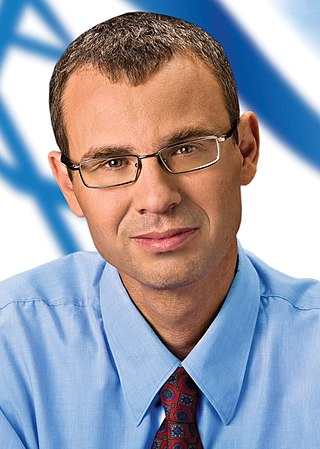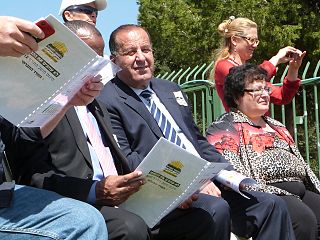Related Research Articles
A head of state is the public persona who officially embodies a state in its unity and legitimacy. Depending on the country's form of government and separation of powers, the head of state may be a ceremonial figurehead or concurrently the head of government and more.

The prime minister of Israel is the head of government and chief executive of the State of Israel.

The Israeli system of government is based on parliamentary democracy. The Prime Minister of Israel is the head of government and leader of a multi-party system. Executive power is exercised by the government. Legislative power is vested in the Knesset. The Judiciary is independent of the executive and the legislature. The political system of the State of Israel and its main principles are set out in 11 Basic Laws. Israel does not have a written constitution.

The president of the State of Israel is the head of state of Israel. The position is largely a ceremonial role, with executive power vested in the cabinet led by the prime minister. The incumbent president is Isaac Herzog, who took office on 7 July 2021. Presidents are elected by the Knesset for a single seven-year term.

Moshe Katsav is an Israeli former politician who was the eighth President of Israel from 2000 to 2007. He was also a leading Likud member of the Israeli Knesset and a minister in its cabinet. He was the second Mizrahi Jew to be elected to the presidency after Yitzhak Navon.

The president of Malta is the constitutional head of state of Malta. The president is indirectly elected by the House of Representatives of Malta, which appoints the president for a five-year term and requires them to swear an oath to "preserve, protect and defend" the Constitution. The president of Malta also resides directly or indirectly in all three branches of the state. They are part of Parliament and responsible for the appointment of the judiciary. Executive authority is nominally vested in the president, but is in practice exercised by the prime minister.

The president of Hungary, officially the president of the republic, is the head of state of Hungary. The office has a largely ceremonial (figurehead) role, but may also veto legislation or send legislation to the Constitutional Court for review. Most other executive powers, such as selecting government ministers and leading legislative initiatives, are vested in the office of the prime minister instead.

The deputies of the prime minister of Israel falls into four categories; Acting Prime Minister, Deputy Prime Minister, Vice Prime Minister and Alternate Prime Minister. Vice Prime Minister is honorary and extra-constitutional position, but entitle the office-holder to a place in the cabinet. Deputy Prime Minister, Designated Acting Prime Minister, and Alternate Prime Minister are constitutional positions.
The Supreme Court is the highest court in Israel. It has ultimate appellate jurisdiction over all other courts, and in some cases original jurisdiction.

Dalia Itzik is a former Israeli politician who last served as a member of the Knesset for Kadima. She has previously served in several ministerial positions, and on 4 May 2006 became the first female speaker of the Knesset, and served as President of Israel in an interim capacity in July 2007. She was the first acting President to have been born in Israeli territory after independence in 1948.

Majalli Wahabi is an Druze-Israeli politician who served as a member of the Knesset for Likud, Kadima and Hatnuah between 2003 and 2013. He briefly assumed the position of Israel's Acting President due to President Moshe Katzav's leave of absence and Interim President Dalia Itzik's trip abroad in February 2007, making him the first non-Jew and the first Druze to be Israel's acting head of state.
The Israeli Ceremonial Protocol does not define an order of precedence. It does define, however, the group of officials that are to attend ceremonial events. This group consists of:
- The President of Israel
- The Prime Minister of Israel
- The Alternate Prime Minister of Israel (vacant)
- The Speaker of the Knesset
- The President of the Supreme Court of Israel
- The Chief Rabbis
- Former Presidents of Israel
- Ministers of the Government
- The Leader of the Opposition
- Head of the Coalition
- Justices of the Supreme Court of Israel, President of the National Labor Court
- The Attorney General of Israel
- The State Comptroller
- The Governor of the Bank of Israel
- Chairman of the Executive of the World Zionist Organization
- Chairman of the Jewish Agency for Israel
- The Dean of the Diplomatic Corps
- The Chief of Staff of the Israeli Defense Forces (הרמטכ"ל)
- The Police Commissioner
- Members of the Knesset
- Commander of the Prison Service, Commissioner of the Fire and Rescue Commission
- Former Prime Ministers, Speakers of Knesset, Chief Rabbis, Presidents of the Supreme court and widows of former Presidents
- Heads of Diplomatic Missions
- Representatives of the minority communities in Israel – Christians, Muslims, Druze, and Circassians
- Mayor of Jerusalem

The acting president of the Republic of Poland is a temporary post provided for by the Polish Constitution.
Events in the year 2007 in Israel.

The president of the Palestinian National Authority is the highest-ranking political position in the Palestinian National Authority (PNA). The president appoints the prime minister of the Palestinian National Authority, who normally requires approval of the Palestinian Legislative Council, and who shares executive and administrative power with the president.
Indirect presidential elections were held in Israel on 10 June 2014. The result was a victory for Reuven Rivlin of the Likud party. Rivlin was sworn in as President of Israel on 24 July.

The Basic Laws of Israel are thirteen quasi-constitutional laws of the State of Israel, and some of them can only be changed by a supermajority vote in the Knesset. Many of these laws are based on the individual liberties that were outlined in the Israeli Declaration of Independence. The Basic Laws deal with the formation and role of the principal institutions of the state, and with the relations between the state's authorities. They also protect the country's civil rights, although some of these rights were earlier protected at common law by the Supreme Court of Israel. The Basic Law: Human Dignity and Liberty enjoys super-legal status, giving the Supreme Court the authority to disqualify any law contradicting it, as well as protection from Emergency Regulations.
The acting president of Turkey is a temporary post provided by the Constitution of Turkey. The acting president is a person who fulfills the duties and powers of the president of Turkey when cases of incapacity and vacancy occur.
References
- 1 2 "Basic Law on Presidency". Archived from the original on October 20, 2017. Retrieved January 8, 2019.